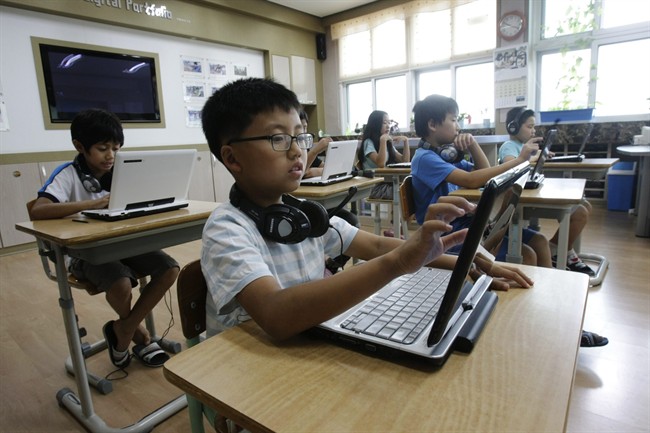TORONTO – Early identification and intensive intervention are key factors in ensuring that children who struggle academically in elementary schools do not fail, say some of the country’s leading psychologists and educational experts.

“Unfortunately, we don’t have the educational assistance needed in schools that could help target the students who are falling behind,” says Dr. Oren Amitay, a Toronto-based clinical psychologist and Ryerson University lecturer who also conducts parenting assessments.
In Ontario alone, schools are mandated to have just one counsellor for every 5,000 kids at the elementary level.
“There really aren’t enough people on staff in elementary schools across Canada to do these assessments,” says Annie Kidder, the executive director of People for Education. “We need to look at the problem, figure out what it really is and figure out if the student needs special education or support and then we need to address those issues.”
At the elementary school level, grade retention means students who do not meet the curriculum expectation in a specified grade are required to repeat the entire grade. The educational philosophy once assumed that retaining a student would make him or her more motivated to learn.
Currently, no province in Canada had an official policy related to retention and decisions are often made at the local level on a case-by-case basis.
Grade retention prevalence in Canada
Amitay says that other factors have to be examined before any failures take place.
“In many cases, there are other factors like a learning disability that has been misdiagnosed or undiagnosed,” he says.
According to Amitay, several common factors of poor academic performance include:
• Low intelligence
• Undiagnosed cases of fetal alcohol syndrome, especially if it’s mild
• Anxiety
• Problems within the home
• Cultural – if kids don’t feel they are part of the system
According to research, retained students are more likely to be male, younger than their classmates, from a low-socio economic class, black or Hispanic and may have evidence of disability and poor health.
A 2003 student learning and performance profile by the Manitoba government found that a higher proportion of students are retained in Grade 1 than in other elementary grade. While there is no current collective research on retention rates across Canada, Kidder says the practice is less common.
“Instantly, one would think it would be a good idea because you don’t want kids progressing at a faster rate than they are ready to progress,” says Kidder. “But when researchers look at what happens to kids that fail in those early grades, they are more likely to do worse rather than better.”
The psychological effect of a retained child
A study published in the 2005 Journal of Applied School Psychology found that students in grade six viewed failing a grade to be a more stressful event than losing a parent or going blind.
“People remember retention their whole lives and the experience is often negative,” says Dr. Ben Levin, a professor at the Ontario Institute for Studies in Education at University of Toronto. “They find it as a shaming experience and they find it diminishes their own self of confidence.”
Amitay, however, says some of the effects might not come from failing itself but for what happens prior to it.
“If a student has a learning disability that goes undiagnosed and is possibly being made to feel stupid by teachers, peers and sometimes family, it can have a dramatic negative consequence on the child,” says Amitay. “The failing itself comes after all those other factors have already been happening during the school year. Many students who have a learning disability may not be diagnosed until years later and had they known sooner, they would not have felt like such a failure.”
“You don’t always need to be held back to feel like a failure,” he says.
Grade retention = higher dropout rates?
Over the years, several studies state that retained students are also more likely to develop negative school attitudes that could lead them to eventually drop out. According to the 2009 National Center for Education Statistics, students who drop out in high school are five times more likely to have been retained than those who graduate.
“People need to look at whether it is being held back that results in poor academic performance or whether being held back is just an excuse,” says Amitay. “There is definitely research that shows being held back does correlate with these different facts but are the real reasons students drop out or are there external factors contributing to it?”
Amitay says often studies that look at behavioural problems tend to correlate dropping out and not performing well academically with grade retention, but that many of these studies are self-reports and not actual experiments.
When it comes to alternative to grade retention, some advocates question whether social promotion is more effective for dealing with academically low-achieving students.
Social promotion
Social promotion is a practice that passes failing students along to the next grade with the intention that, over time, they would make up their learning shortfalls. Advocates of this practice claim that by keeping pupils with their peers, the student’s self-esteem is not harmed.
But Amitay says, like with grade retention, social promotion is not a solution for low-achieving students if they are not properly assessed beforehand.
Overall, when it comes to a child’s education, Amitay says the primary responsibility lies with the parent-not the school.
“The schools are not the children’s parents, they are educators,” says Amitay. “Parents have to be more on board with their kid’s education. Parents have to take more responsibility for what is going on with their children in and after school. A good parent is able to address their children’s needs, weaknesses and limitations honestly and appropriately.”



Comments